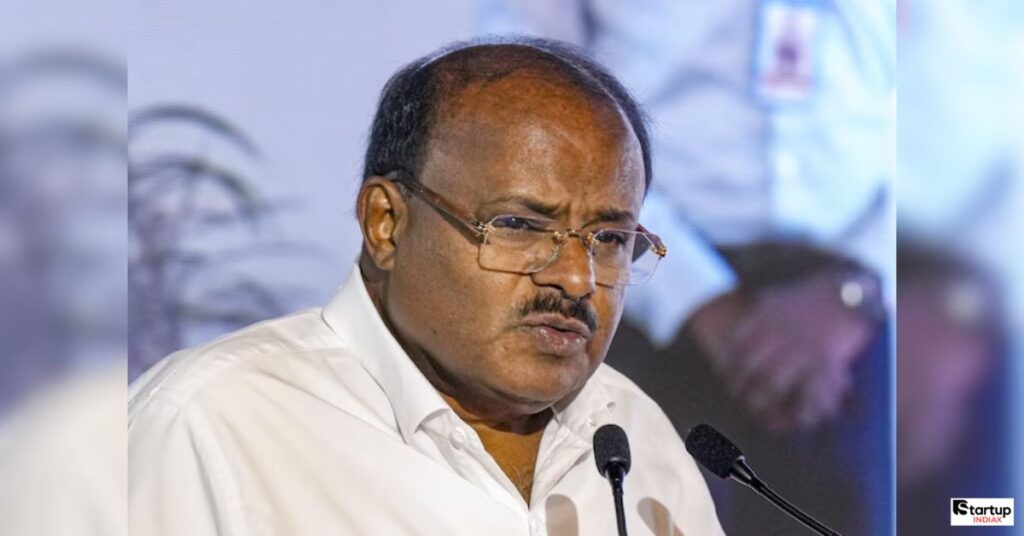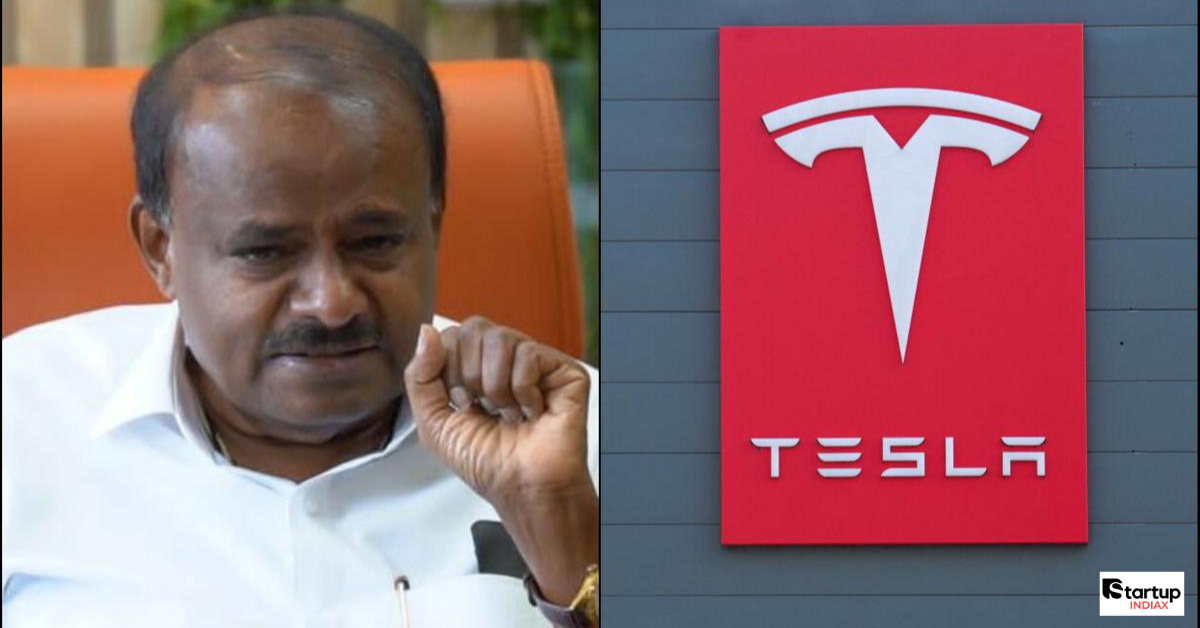Tesla Not Interested In Manufacturing In India, as revealed by Union Minister HD Kumaraswamy, marks a pivotal shift in the electric vehicle (EV) giant’s approach to the Indian market. This article uncovers the five key reasons behind Tesla’s decision to focus on showrooms rather than factories, exploring the implications for India’s EV ecosystem and opportunities for startups on platforms like Startup INDIAX. From import tariffs to global competition, we’ll dive into why Tesla is taking a cautious route and what it means for India’s electric mobility future.
Table of Contents
5 Reasons Tesla Not Interested In Manufacturing In India
Tesla Not Interested In Manufacturing In India, a statement that has sparked curiosity and debate across India’s startup and automotive sectors. Union Minister HD Kumaraswamy’s recent revelation highlights Tesla’s shift toward opening showrooms instead of building factories. Here are the five key reasons behind this strategic pivot:
- High Import Tariffs: India’s import duties, which can reach up to 110% on fully built vehicles, have been a major hurdle. Tesla has long pushed for tariff reductions, but India insists on local manufacturing for duty concessions. Tesla’s reluctance to commit to a factory suggests the economics don’t align yet.
- Global Political Pressures: Elon Musk’s ties with US President Donald Trump may be influencing Tesla’s strategy. Trump has criticized companies manufacturing abroad to bypass tariffs, calling it unfair to the US. With Tesla’s China-made vehicles facing 245% US tariffs, Musk may be hesitant to invest in another overseas plant.
- Financial Caution: Tesla has faced challenges recently, including a drop in global deliveries and intense competition from rivals like BYD. Building a factory requires significant capital—potentially $500 million or more under India’s EV policy—making showrooms a less risky entry point.
- Testing the Market: By focusing on showrooms in cities like Delhi and Mumbai, Tesla can gauge consumer demand without the heavy investment of a factory. This allows the company to build brand presence and test India’s appetite for premium EVs.
- Policy Misalignment: India’s EV manufacturing scheme requires a $500 million investment and local production within three years. Tesla’s minimal engagement in policy discussions, as noted by Kumaraswamy, indicates the terms may not suit its current priorities.
For the Startup INDIAX community, these reasons highlight how global and local factors shape corporate decisions, offering insights into navigating India’s EV landscape.
Union Minister HD Kumaraswamy’s Announcement
Union Minister HD Kumaraswamy dropped a bombshell on June 2, 2025, during a press conference about India’s EV manufacturing scheme. “Tesla is not interested in manufacturing in India,” he said. “They are only looking to start operations through showrooms.” This clear statement puts an end to years of speculation about a Tesla gigafactory in India, which many hoped would boost jobs and local innovation.

For readers on Startup INDIAX, Kumaraswamy’s announcement signals a missed opportunity for large-scale economic impact. A Tesla factory could have created thousands of jobs and spurred growth in the EV supply chain. Instead, Tesla’s showroom strategy focuses on selling premium vehicles to India’s affluent buyers, limiting its immediate influence on the broader ecosystem. However, this also opens the door for other automakers to take center stage, as we’ll explore later.
India’s EV Policy: Why Tesla Stepped Back
India’s “Scheme to Promote Manufacturing of Electric Passenger Cars in India,” launched in March 2024, was designed to attract global EV players like Tesla. The policy offers a reduced 15% import duty on up to 8,000 EVs annually, but there’s a catch: companies must invest at least $500 million in a local plant within three years. This was seen as a tailor-made incentive for Tesla, which has long criticized India’s high tariffs.
Yet, Tesla Not Interested In Manufacturing In India, as Kumaraswamy confirmed. The $500 million investment threshold, combined with the mandate for local production, appears too steep for Tesla’s current strategy. A government official noted that Tesla participated in initial policy talks but skipped later rounds, signaling a lack of commitment. For startups on Startup INDIAX, this underscores the importance of aligning business plans with government incentives to unlock opportunities in India’s EV sector.
Global Automakers Seizing India’s EV Market
While Tesla Not Interested In Manufacturing In India, other global automakers are eagerly stepping in. Kumaraswamy highlighted that companies like Mercedes-Benz, Skoda-Volkswagen, Hyundai, and Kia are showing strong interest in India’s EV policy. These players are engaging with the government and are likely to invest in local production, positioning India as a growing EV manufacturing hub.
Chinese EV giant BYD, which surpassed Tesla in global sales in 2024, is planning its first plant in India. This move could shake up the market, offering affordable EVs to compete with local players like Tata Motors. European and South Korean automakers are also drawn to India’s expanding middle class and rising demand for sustainable transport. For Startup INDIAX entrepreneurs, this influx of global players creates opportunities to supply components, develop charging infrastructure, or innovate in EV software.
Impact on India’s EV Ecosystem and Startups
Tesla’s decision to prioritize showrooms over manufacturing has significant ripple effects for India’s EV ecosystem. A gigafactory could have generated thousands of jobs, boosted local suppliers, and accelerated charging network growth. Instead, Tesla’s retail-only approach limits its economic impact, leaving room for competitors to drive innovation.
For startups on Startup INDIAX, this presents a dual reality. On one hand, the absence of a Tesla factory means fewer immediate partnerships for local suppliers and tech innovators. On the other, the entry of automakers like BYD, Hyundai, and Mercedes-Benz could spark demand for solutions in battery technology, fleet management software, and fast-charging stations. Tesla’s showrooms, meanwhile, could boost consumer interest in EVs, indirectly benefiting startups by increasing market demand.
India’s EV market is on track to grow significantly, with the government targeting 30% electric vehicle sales by 2030. Tesla’s presence, even if limited to retail, could help normalize EVs among Indian buyers, creating a fertile ground for startups to innovate.
Tesla’s Showroom Plans in India
Despite Tesla Not Interested In Manufacturing In India, the company is moving forward with its retail strategy. Tesla has secured showroom locations in Delhi and Mumbai and is hiring for over 25 roles, from sales to service staff. The 2025 Tesla Model Y, recently spotted testing near Mumbai, is expected to be Tesla’s first offering, targeting India’s premium EV market.
However, high import duties could make Tesla’s vehicles expensive, limiting their appeal to a niche segment. Competition from local brands like Tata Motors and global players like BYD will also challenge Tesla’s pricing and market share. For Startup INDIAX readers, Tesla’s retail push could open doors for partnerships in marketing, customer experience, or after-sales support, even if manufacturing opportunities remain limited.
Conclusion
Tesla Not Interested In Manufacturing In India, as stated by Union Minister HD Kumaraswamy, marks a significant pivot in the EV giant’s strategy, opting for showrooms over factories in one of the world’s fastest-growing markets. While this decision limits Tesla’s immediate economic impact, it opens doors for other global automakers like BYD, Mercedes-Benz, and Hyundai to drive India’s EV revolution. For the Startup INDIAX community, this shift presents a wealth of opportunities to innovate in areas like charging infrastructure, battery technology, and customer experience solutions. As India’s EV market accelerates toward its 2030 goal of 30% electric vehicle sales, platforms like Startup INDIAX will be key in connecting entrepreneurs with investors and partners to shape the future of electric mobility. Tesla’s showroom strategy may be cautious, but India’s EV journey is just getting started, and the potential for growth and innovation is limitless.

